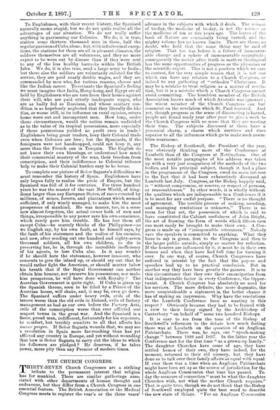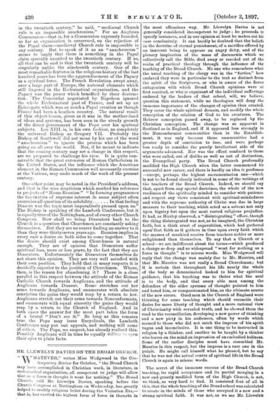THE CHURCH CONGRESS.
THIRTY-SEVEN Church Congresses are a striking tribute to the permanent interest that religion has for mankind. There are similar gatherings asso- ciated with other departments of human thought and endeavour, but they differ from a Church Congress in one essential feature. The British Association or the Medical Congress meets to register the year's or the three years' advance in the subjects with which it deals. The science of to-day, the medicine of to-day, is not the science or the medicine of ten or five years ago. The leaves of the book of Nature are continually being turned, and the mighty volume has no known limits. There are those, no doubt, who hold that the same thing may be said of religion. That too has before it a future of immeasur- able change and a sphere of immeasurable magnitude ; consequently the seeker after truth in matters theological has the same opportunities of progress as the physician or the scientific expert. This is not a position which we care to contest, for the very simple reason that it is not one which can have any relation to a Church Congress, or indeed to any gathering of " orthodox " Christians. It may be a mistake to treat religion as a matter of revela- tion, but it is a mistake which a Church Congress cannot avoid committing. The humblest member of the British Association knows much of which Aristotle was ignorant ; the wisest member of the Church Congress can but comment on the revelation which St. Paul received. And yet, though progress in the sense of discovering is barred, people are found ready year after year to give a week to the Church Congress with no sense that they are wasting their time. The subjects discussed at them have a perennial charm, a charm which survives and rises superior to all the influences which go to make such assem- blies wearisome.
The Bishop of Southwell, the President of tho year, was obviously thinking more of the Conference at Lambeth than of the Congress at Nottingham. One of the most notable paragraphs of his address was taken up with a very just comparison of the methods of the two bodies, and his principal subject, though it had a place in the programme of the Congress, owed its main interest to the fact that it had been exhaustively discussed at Lambeth last July. Congress, as the Bishop happily said, is " without compromise, or reserve, or respect of persons, or reasonableness." In other words, it is wholly without the qualities which are indispensable to a Conference if it is to meet for any useful purpose. " There is no thought of agreement. The terrible process of making, mending, and managing resolutions is unknown." There is no- room for that art, the possession of which is said to have constituted the Cabinet usefulness of John Bright, the art of framing the form of words which fifteen men can most easily be brought to make their own. A Con- gress is made up of "irresponsible utterances." Nobody save the speakers is committed to anything. What they have to say is given, first to the Congress and then to the larger public outside, simply as matter for reflection. If the hearers are influenced by it, it must be in their own homes and when they have had full time for turning it over. In one way, of course, Church Congresses have suffered in interest by the fact that the papers and speeches lead up to no practical conclusion. But in another way they have been greatly the gainers. It is to this circumstance that they owe their emancipation from that indispensable factor in every Conference, the Oppor- tunist. A Church Congress has absolutely no need for his services. The more definite, the more dogmatic, the more unmistakeable a statement is, the better chance it has of making an impression. Why have the resolutions of the Lambeth Conference been so wanting in this respect ? Obviously because they had to be framed with a view to their being signed by the Archbishop of Canterbury " on behalf of " some two hundred Bishops.
It is easy to see from the tone of the Bishop of Southwell's references to the debate how much feeling there was at Lambeth on the question of an Anglican Patriarchate. There was, he says, one " epoch-making change " between 1888 and 1897. In the latter year the Conference met for the first time " as a grown-up family." The daughter Churches have come of age, they have settled homes of their own, they have indeed, for the moment, returned to their old nursery, but they have done so to talk over their family affairs as equal with equal. If ever there was a time when an Anglican Patriarchate might have been set up as the source of jurisdiction for the whole Anglican Communion that time has passed. To- day the measure of connection " must be what the daughter Churches wish, not what the mother Church requires." That is quite true, though we do not think that the Bishop of Southwell employed quite the best word to describe the new state of things. "For an Anglican Communion in the twentieth century," he said, " mediaeval Church rule is an impossible anachronism." For an Anglican Communion—that is, for a Communion expressly founded, so far as organisation is concerned, on the rejection of the Papal claim—mediaeval Church rule is impossible in any century. But to speak of it as an " anachronism " seems to imply that there is something in the Papal claim specially unsuited to the twentieth century. If so, all that can be said is that the twentieth century will be singularly unlike the nineteenth century. One of the most remarkable features in the religious history of the last hundred years has been the aggrandisement of the Papacy as a spiritual force. The French Revolution swept away, over a large part of Europe, the national elements which still lingered in the Ecclesiastical organisation, and the Papacy was the power which benefited by their destruc- tion. The Concordat negotiated by Napoleon ignored the whole Ecclesiastical past of France, and set up an Episcopate which was as much a Papal creation as though France had been a heathen country. The natural result of this object-lesson, given as it was in the mother-land of ideas and systems, has been seen in the steady growth of the direct government of the Pope over his spiritual subjects. Leo XIII. is, in his own fashion, as completely the universal Bishop as Gregory VII. Probably the Bishop of Southwell did not mean by his use of the word " anachronism " to ignore the process which has been going on all over the world. Nor, if he meant to indicate that the coming century may see a change in this respect, are we prepared to challenge his view. It is quite con- ceivable that the great extension of Roman Catholicism in the United States, and the influence which the American element in the Roman Communion will necessarily exercise at the Vatican, may undo much of the work of the present century.
One other point may be noted in the President's address, and that is the wise scepticism which marked his reference to projects of" Home Reunion." " In forming programmes the fascination of supreme interest ti some subject often overrules all question of its solubility In that feeling Dissent was the topic most imperatively pressed upon us." The Bishop is speaking of the Lambeth Conference, but it is equally true of the Nottingham, and of every other Church Congress. How shall we bring Dissenters back to the Church is a question that Churchmen are constantly asking themselves. But they are no nearer finding an answer to it than they were thirty-seven years ago. Reunion implies in every case a desire on both sides to come together. That the desire should exist among Churchmen is natural enough. They are of opinion that Dissenters suffer spiritual loss, more or less grave, by the fact that they are Dissenters. Unfortunately the Dissenters themselves do not share this opinion. They are very well satisfied with their own position. They hold that in many respects it is decidedly superior to the position of Churchmen. Where, then, is the reason for abandoning it ? There is a close parallel in this respect between the attitude of the Roman Catholic Church towards Anglicans, and the attitude of Anglicans towards Dissent. Rome stretches out her arms towards Anglicans, and enumerates with absolute conviction the gains they would reap by a return to her. Anglicans stretch out their arms towards Nonconformists, and enumerate with equal sincerity the gains they would reap by a return to the Church of England. And in both cases the answer for the most part takes the form of a brutal " Don't see it." So long as this remains true the Pope may issue Encyclicals, the Lambeth Conference may put out appeals, and nothing will come of either. The Pope, we suspect, has already realised this. Possibly Anglicans will in time be equally willing to open their eyes to plain facts.







































 Previous page
Previous page